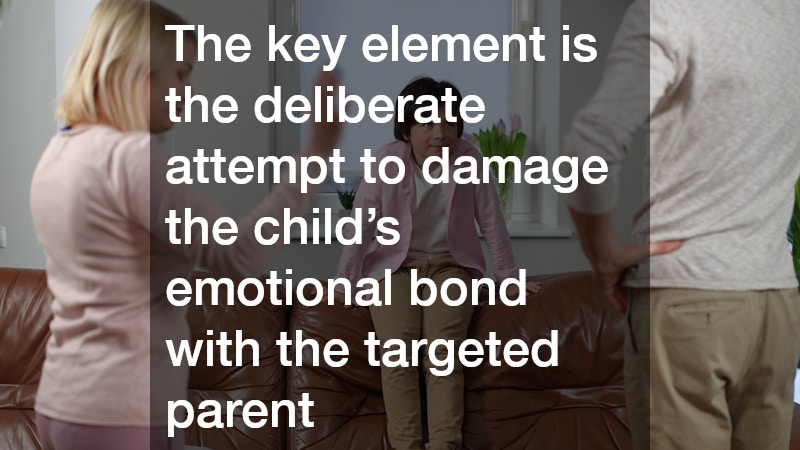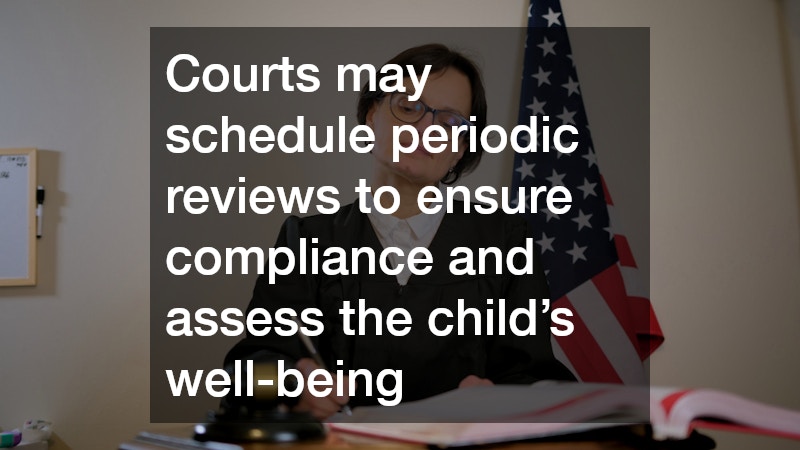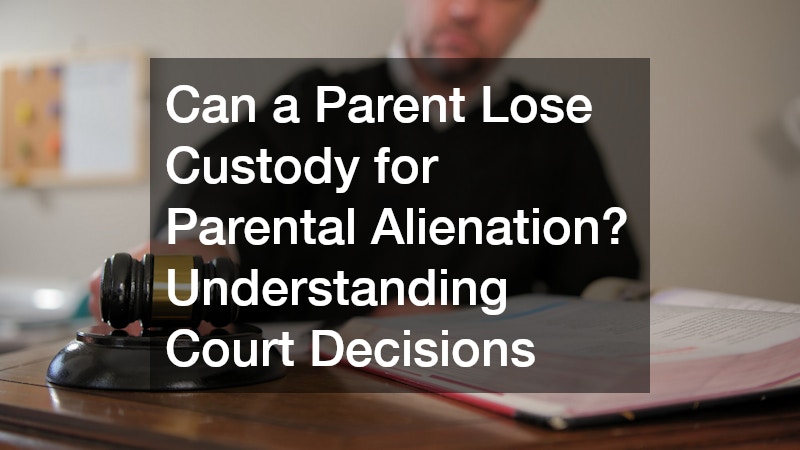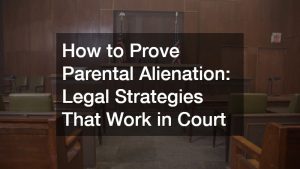- Parental alienation involves one parent intentionally undermining a child’s relationship with the other parent, which can cause long-term emotional harm.
- Courts prioritize the child’s best interests, focusing on maintaining meaningful relationships with both parents.
- A parent can lose custody if evidence shows persistent alienating behavior that negatively impacts the child’s emotional or psychological well-being.
- Effective evidence includes written records, communications, witness testimonies, and psychological evaluations documenting alienation patterns.
- Parental alienation can result in anxiety, depression, low self-esteem, and loyalty conflicts in children.
- Proactive steps, such as maintaining positive communication, keeping detailed records, and participating in counseling or mediation, help protect parents’ custody rights.
- Custody modifications may include supervised visitation, transfer of primary custody, therapy requirements, and periodic court monitoring to safeguard the child’s well-being.
Parental alienation has become an increasingly discussed topic in family law, especially when custody disputes arise. Courts recognize that a child’s emotional well-being is of paramount importance, and any attempts to manipulate or estrange a child from one parent can significantly influence custody decisions. This article explores the concept of parental alienation, its impact, and how courts determine whether a parent could lose custody as a result.
What is Parental Alienation?

Parental alienation occurs when one parent intentionally undermines the child’s relationship with the other parent. This behavior can take many forms, including:
- Speaking negatively about the other parent in front of the child
- Limiting or interfering with communication between the child and the other parent
- Encouraging fear, distrust, or hostility toward the other parent
- Using the child to relay messages or express grievances
The key element in parental alienation is the deliberate attempt to damage the child’s emotional bond with the targeted parent. Over time, this can cause serious psychological harm and disrupt the child’s sense of stability and security.
How Do Courts View Parental Alienation?
Courts take parental alienation seriously because it affects the child’s best interests. Family courts prioritize the child’s emotional health and the right to maintain a meaningful relationship with both parents. Judges often rely on:
- Testimony from parents, children, and witnesses
- Reports from child psychologists or social workers
- Patterns of behavior that indicate alienation or manipulation
Courts are careful to distinguish between legitimate concerns about a parent’s behavior (such as abuse or neglect) and unfounded alienation attempts. Accurate documentation and professional evaluations are crucial in demonstrating parental alienation.
Can a Parent Lose Custody for Parental Alienation?
Yes, in certain cases, a parent can lose custody if a court finds sufficient evidence of parental alienation. The extent of custody loss depends on factors such as:
- Severity and persistence of alienating behavior
- Impact on the child’s emotional and psychological well-being
- Willingness of the parent to cooperate with court-ordered interventions, such as counseling or co-parenting programs
Courts typically consider modifying custody only when alienation is harming the child’s relationship with the other parent. This can result in temporary or permanent changes, including:
- Reduced visitation or supervised visitation for the alienating parent
- Transfer of primary custody to the targeted parent
- Mandatory participation in family therapy or parenting programs
What Evidence Do Courts Require?
Proving parental alienation requires clear evidence. Understanding how to prove parental alienation is essential when preparing for a custody case. Some of the most effective forms of documentation include:
- Written records of denied visitation or communication
- Text messages, emails, or social media posts showing attempts to undermine the other parent
- Testimonies from teachers, therapists, or family members who observe the child’s behavior
- Psychological evaluations that demonstrate changes in the child’s emotional state
Courts look for patterns over time rather than isolated incidents. Consistency and credibility of evidence are key to influencing custody decisions.
How Does Parental Alienation Affect the Child?
Parental alienation can have severe and long-lasting consequences for children, including:
- Anxiety and depression
- Low self-esteem and lack of confidence
- Difficulty forming trusting relationships
- Behavioral problems in school or social settings
- Loyalty conflicts between parents
Children may internalize negative messages from the alienating parent, leading to confusion and emotional distress. Courts consider these effects when evaluating whether a custody change is necessary.
Are All Accusations of Parental Alienation Taken Seriously?
Not every claim of parental alienation is automatically accepted by the court. Judges carefully evaluate:
- Whether the alleged alienation is intentional or a misunderstanding
- Whether the child’s preferences are being influenced or expressed naturally
- Any other circumstances that may explain the child’s reluctance to interact with a parent
False or exaggerated accusations can harm the accused parent and may be considered when determining custody. That is why thorough documentation and professional guidance are essential.
How Can a Parent Protect Themselves from Alienation Claims?
Parents can take proactive steps to protect themselves from false accusations of alienation and demonstrate their commitment to the child’s well-being:
- Encourage open communication with both parents
- Avoid speaking negatively about the other parent
- Keep records of visitation schedules, emails, and interactions
- Seek counseling or parenting classes if recommended by the court
- Cooperate with court-ordered mediation or therapy sessions
By maintaining a consistent, positive approach, parents can strengthen their case and show that they prioritize the child’s best interests.
What Happens During Custody Modification?

If a court finds evidence of parental alienation, custody modifications may be implemented to protect the child:
- Supervised visitation: The alienating parent may only visit the child under supervision.
- Transfer of custody: Primary custody may be shifted to the targeted parent.
- Therapy requirements: Both parent and child may be required to participate in therapy to restore the relationship.
- Monitoring and follow-up: Courts may schedule periodic reviews to ensure compliance and assess the child’s well-being.
These measures aim to minimize emotional harm to the child while encouraging healthier co-parenting relationships.
Can Mediation Help in Parental Alienation Cases?
Mediation can be an effective tool to address conflicts without immediate court intervention. It provides:
- A neutral space for parents to discuss concerns
- Guidance from a trained mediator to improve communication
- Recommendations for co-parenting strategies that prevent alienation
Although mediation cannot enforce legal custody changes, it may prevent further escalation and help parents maintain a collaborative approach.
How to Seek Legal Assistance
When parental alienation becomes a concern, it is essential to consult a family law attorney. Legal professionals can:
- Evaluate the strength of your case
- Guide you in collecting and presenting evidence
- Represent your interests in court or mediation
- Advise on custody modifications or protective measures
Early intervention is key. Addressing alienation promptly can reduce emotional damage to the child and improve the likelihood of favorable custody outcomes.
Tips for Documenting Parental Alienation
Accurate documentation is one of the strongest tools in proving parental alienation. Parents should consider:
- Keeping a daily or weekly journal of interactions with the child
- Saving emails, texts, and social media communications
- Noting missed visitations or canceled events
- Collecting statements from teachers, counselors, or relatives
Well-documented evidence helps establish patterns of alienation and strengthens the case in court.
How to Support a Child During Custody Disputes
Children are directly affected by parental alienation and custody battles. Parents can help by:
- Maintaining routines and stability
- Encouraging open dialogue about feelings
- Avoiding negative comments about the other parent
- Seeking professional counseling if necessary
- Emphasizing that the child’s relationship with both parents is important
Supportive parenting reduces the emotional impact and helps children navigate challenging family dynamics.
In Summary
Parental alienation is a serious issue that can significantly affect custody decisions. Courts prioritize the child’s emotional well-being and may modify custody if alienating behavior is proven. Evidence, documentation, and professional evaluations are critical in these cases. Parents should focus on cooperation, maintaining a positive relationship with their child, and following legal guidance to ensure the child’s best interests remain the priority.
By understanding the legal implications and taking proactive steps, parents can protect their rights while supporting their child’s emotional health. The courts are vigilant about parental alienation, and with the right approach, both parents can work toward a healthier co-parenting dynamic.






